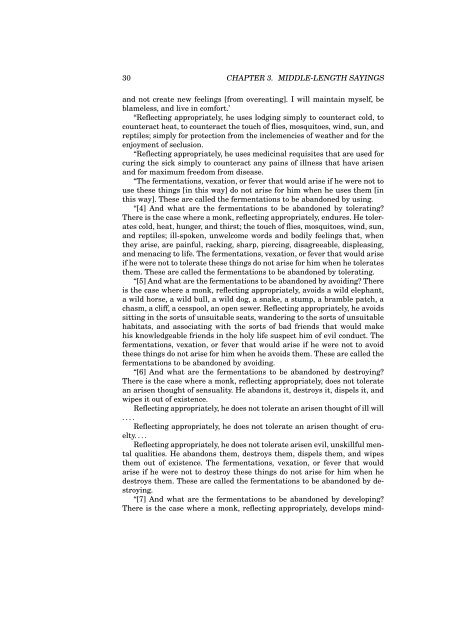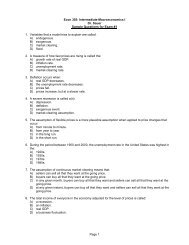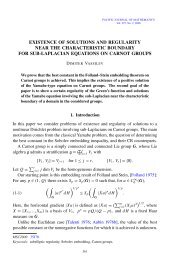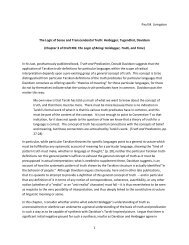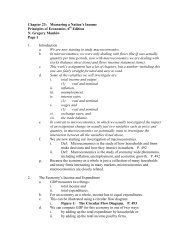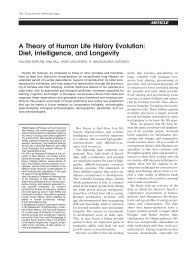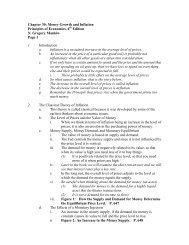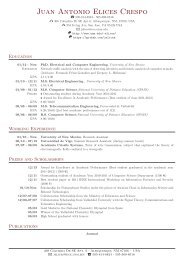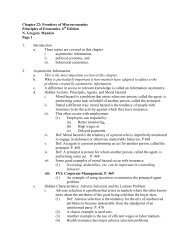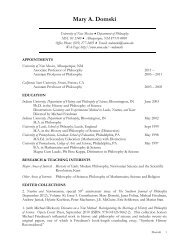Philosophy 438 Indian Buddhist Philosophy Buddhist Views of the ...
Philosophy 438 Indian Buddhist Philosophy Buddhist Views of the ...
Philosophy 438 Indian Buddhist Philosophy Buddhist Views of the ...
Create successful ePaper yourself
Turn your PDF publications into a flip-book with our unique Google optimized e-Paper software.
30 CHAPTER 3. MIDDLE-LENGTH SAYINGS<br />
and not create new feelings [from overeating]. I will maintain myself, be<br />
blameless, and live in comfort.’<br />
“Reflecting appropriately, he uses lodging simply to counteract cold, to<br />
counteract heat, to counteract <strong>the</strong> touch <strong>of</strong> flies, mosquitoes, wind, sun, and<br />
reptiles; simply for protection from <strong>the</strong> inclemencies <strong>of</strong> wea<strong>the</strong>r and for <strong>the</strong><br />
enjoyment <strong>of</strong> seclusion.<br />
“Reflecting appropriately, he uses medicinal requisites that are used for<br />
curing <strong>the</strong> sick simply to counteract any pains <strong>of</strong> illness that have arisen<br />
and for maximum freedom from disease.<br />
“The fermentations, vexation, or fever that would arise if he were not to<br />
use <strong>the</strong>se things [in this way] do not arise for him when he uses <strong>the</strong>m [in<br />
this way]. These are called <strong>the</strong> fermentations to be abandoned by using.<br />
“[4] And what are <strong>the</strong> fermentations to be abandoned by tolerating?<br />
There is <strong>the</strong> case where a monk, reflecting appropriately, endures. He tolerates<br />
cold, heat, hunger, and thirst; <strong>the</strong> touch <strong>of</strong> flies, mosquitoes, wind, sun,<br />
and reptiles; ill-spoken, unwelcome words and bodily feelings that, when<br />
<strong>the</strong>y arise, are painful, racking, sharp, piercing, disagreeable, displeasing,<br />
and menacing to life. The fermentations, vexation, or fever that would arise<br />
if he were not to tolerate <strong>the</strong>se things do not arise for him when he tolerates<br />
<strong>the</strong>m. These are called <strong>the</strong> fermentations to be abandoned by tolerating.<br />
“[5] And what are <strong>the</strong> fermentations to be abandoned by avoiding? There<br />
is <strong>the</strong> case where a monk, reflecting appropriately, avoids a wild elephant,<br />
a wild horse, a wild bull, a wild dog, a snake, a stump, a bramble patch, a<br />
chasm, a cliff, a cesspool, an open sewer. Reflecting appropriately, he avoids<br />
sitting in <strong>the</strong> sorts <strong>of</strong> unsuitable seats, wandering to <strong>the</strong> sorts <strong>of</strong> unsuitable<br />
habitats, and associating with <strong>the</strong> sorts <strong>of</strong> bad friends that would make<br />
his knowledgeable friends in <strong>the</strong> holy life suspect him <strong>of</strong> evil conduct. The<br />
fermentations, vexation, or fever that would arise if he were not to avoid<br />
<strong>the</strong>se things do not arise for him when he avoids <strong>the</strong>m. These are called <strong>the</strong><br />
fermentations to be abandoned by avoiding.<br />
“[6] And what are <strong>the</strong> fermentations to be abandoned by destroying?<br />
There is <strong>the</strong> case where a monk, reflecting appropriately, does not tolerate<br />
an arisen thought <strong>of</strong> sensuality. He abandons it, destroys it, dispels it, and<br />
wipes it out <strong>of</strong> existence.<br />
Reflecting appropriately, he does not tolerate an arisen thought <strong>of</strong> ill will<br />
. . . .<br />
Reflecting appropriately, he does not tolerate an arisen thought <strong>of</strong> cruelty.<br />
. . .<br />
Reflecting appropriately, he does not tolerate arisen evil, unskillful mental<br />
qualities. He abandons <strong>the</strong>m, destroys <strong>the</strong>m, dispels <strong>the</strong>m, and wipes<br />
<strong>the</strong>m out <strong>of</strong> existence. The fermentations, vexation, or fever that would<br />
arise if he were not to destroy <strong>the</strong>se things do not arise for him when he<br />
destroys <strong>the</strong>m. These are called <strong>the</strong> fermentations to be abandoned by destroying.<br />
“[7] And what are <strong>the</strong> fermentations to be abandoned by developing?<br />
There is <strong>the</strong> case where a monk, reflecting appropriately, develops mind-


